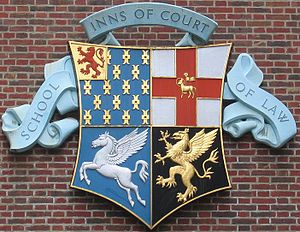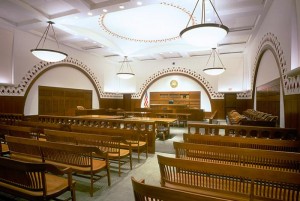One question that I am asked from time to time has to do with the origins of the expression “passing the bar”. A common assumption is that there is some connection with admission to the legal profession and the ancient relationship between lawyers and taverns. This has some plausibility as courts in the medieval and Elizabethean eras were not infrequently held in public places, including taverns (but also including churches, town and meeting halls, and the like). However much the public may enjoy the putative connection between the legal profession and alcoholic libations, however, this is not the true origin of the term.
The word “barrister” shows us much more clearly the etymology of this phrase, as barrister (the lawyer who argues cases in court) is derived from the old French barre or Latin barra, meaning “bar”. The bar in question here was not a place that served alcohol, but rather is a reference to the wooden bar or barrier that commonly stood near the front of the courtroom at the ancient Inns of Court in London, used by the English and Welsh legal profession to admit newcomers into their ranks. A barrier, or bar, separated “benchers” from the main hall; students who had attained a certain level of expertise and standing were then “called to the bar” to participate in the Inn’s moot court exercises.
By the early 1600s, however, “bar” referred mainly to the bar in courthouses that separated the officers of the law (judges, counsel, bailiffs, etc.) from those not admitted into the legal profession or otherwise a party. Besides having a symbolic function, this might also have had a practical benefit as it separated the (sometimes racuous) spectators from those conducting and participating in the business of the court. To disbar, then, was to remove someone from the ability to come to the bar (or within the bar, as was the case with King’s or Queen’s Counsel, who were said to have been “called within the bar”). Bar eventually became synonomous with the place where cases were argued in court, and eventually with the court itself and those admitted to practice. Its modern meaning typically references formal admission to the profession of law, populary known as “passing” or being “admitted” to the bar. The “bar” today, as used in the United States, does not reference the physical separation in courtrooms (which typically still exists in some form) but rather is used as a collective noun to refer to all the members of the legal profession in a specific jurisdiction (e.g., “the Massachusetts bar”).
As an interesting aside, the modern and beautiful Moakley Federal courthouse in Boston has courtrooms that still have partitions between the gallery and the rest of the courtroom, but the partition has openings in it (see picture below); I am told this is to symbolize public access to justice.



I enjoyed learning this legal fact! Great website, continue the good work!
Pingback: Your Halloween Legal Fact of the Week | Executive LLM Program
Hello there prof! This article reminded me about a discussion I once had with my previous roommate when she was going to lawschool. I will forward this information to her as I’m pretty sure she’ll have a great read. I appreciate you sharing!
Pingback: Crossing the Bar: Notable Lawyers Who Left Us in 2015 – Bank Robbing
Another possibility for the origin of this phrase: Most bays, harbors and rivers have a sandbar or raised area at the entrance that sailing ships had to pass through, via wending their way through the places deep enough to pass through safely, or by waiting for the tide to rise high enough that they were able to sail over or pass the bar. The phrase was wel known among sailors and came to be applied to a rite of passage or test of some sort.
hi Andy– that’s an interesting one. Had never heard it in that context before. Thanks for posting!
The law we practise today is admiral law or merchant law.it should never be used on the land yet has been permitted by federalists.we on the land are protected by natural law,the law of the jungle so to speak.
Not sure I understand what you mean….
Pingback: The Lawyers’ “Secret Oath” | Philip Marks – philipem1000
Loved reading where this term might of originated. It’s funny too in our English language how often the word Bar can be used in conjunction with others to display a higher standard, such as, we set our own Bar in life, or we are asked to raise the Bar of our expectations, etc. You have to wonder if terms like those derived alongside as they seem to mirror it so very well.
Hi– thanks for leaving the comment! You raise an interesting point. Personally, I think that ‘raise the bar’ and related expressions derive from the sports world rather than the legal one. Some evidence for this includes: , and https://www.quora.com/Whats-the-origin-of-the-phrase-raise-the-bar. Cheers, Ian
Thanks for the information! I have often wondered about the origins of the phrase ‘passing the bar.’
thank you Micheal for taking the time to write. cheers, Ian